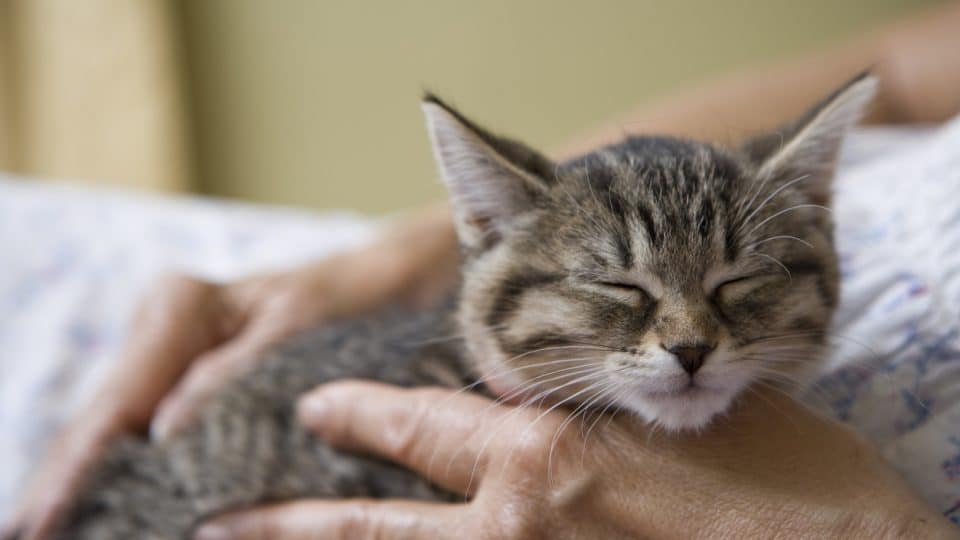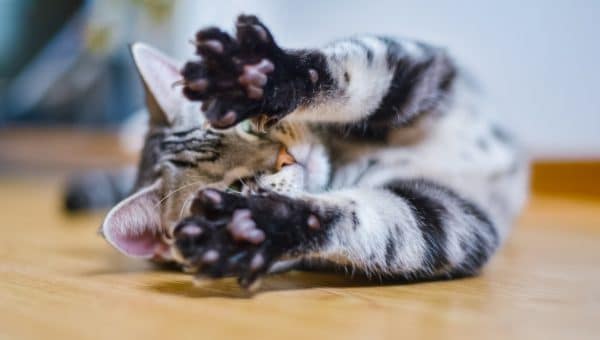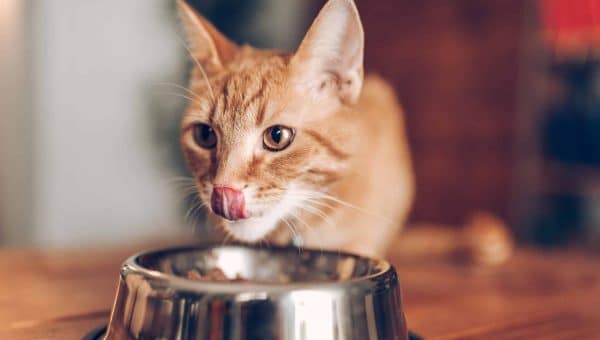Cat are creatures of mystery, but decoding a purr is pretty straightforward. Your biggest clue? Context.
We tend to assume our kitties’ rhythmic rumblings are a sign of good cheer, and quite often, they are. Cats purr for positive reasons, such as feeling content or relaxed. But this isn’t always the case. There is evidence that your cat may also purr out of fear, anxiety, or pain.
We talk to experts and researched some of the common reasons why cats purr. You should be able to identify different cat sounds by observing your pet’s surroundings, body language, and behavior.
1. Your Cat Is Relaxed & Happy
Luckily, translating a purr is as simple as observing how and where it happens. For instance, a serene kitty in a relaxed napping position is probably purring because she’s happy. Purring that occurs alongside nervous behavior, like tail-flicking or panting, tells another story.
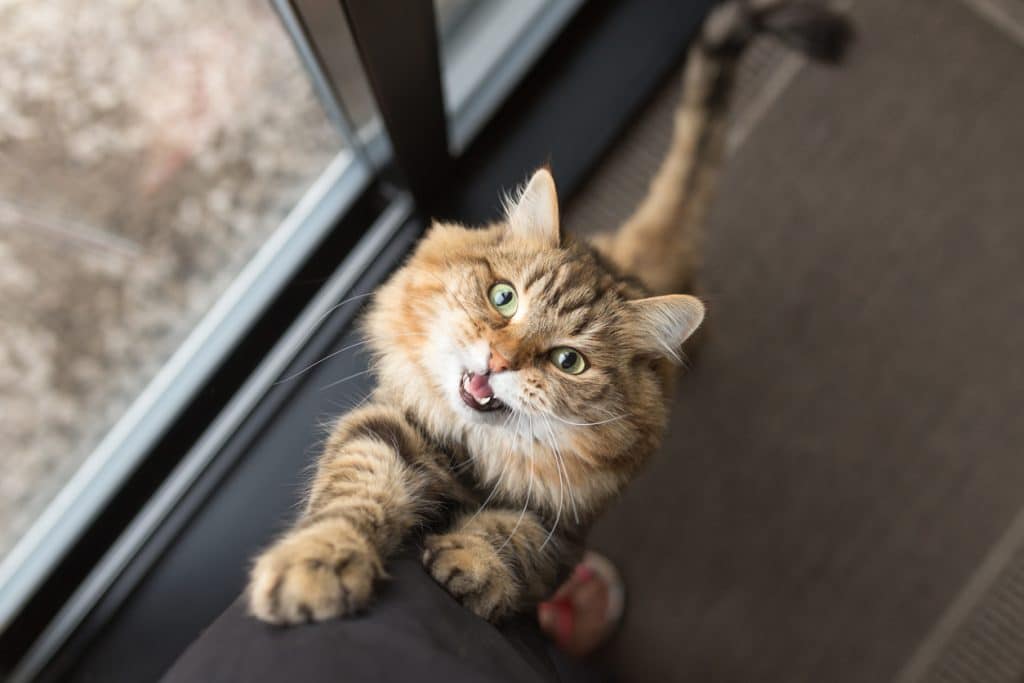
iStock/marieclaudelemay
2. To Bond and Show Affection
Purring starts at a young age. While nursing, a mother cat and her kittens will purr to bond with each other (how sweet!) Cats also purr to express love for their human companions. It’s not unusual for purring to kick into high gear when a cat is cuddling or kneading on a soft surface—especially when it’s their favorite human.
3. To Signal Their Location
Because they’re born blind and deaf, kittens need an alternative way to locate momma cat. When it’s time for milk, kittens are guided by the vibrations of their mother’s purr. A kitten will also purr loudly to make it easier for their mother to find them.
4. Your Cat Is In Pain
It might seem odd, but pain and purring often coexist. Cats purr while giving birth and when they’re dying. Dr. Sabrina Kong, a veterinarian working with We Love Doodles, fills us in on the reason behind this.
“According to research, purring can actually help a cat feel better when going through painful situations because it releases endorphins,” she explains. These feel-good chemicals offer your cat relief, helping her cope with discomfort.
Dr. Kong adds that the low frequency of your cat’s purrs (usually around 25 – 150 Hz) has been shown to decrease stress levels, lower blood pressure, and ease labored breathing in cats.
5. Your Cat Is Comforting or Healing Themselves
Piggy-backing on our last point, purring not only eases pain, but it might actually enhance a cat’s ability to heal. Vibration therapy at frequencies between 20 and 150 Hertz has been shown to speed up the healing of bones, tendons, and wounds. According to Dr. Megan Conrad, a veterinarian working with telehealth pet service Hello Ralphie, a cat’s purr falls well within this range. “In some studies, a hum at this frequency has been shown to stimulate muscle and possibly bone healing, as well as pain relief,” she tells us.
What’s more, this healing power isn’t limited to felines. As Dr. Kong points out, there’s ample evidence to suggest cats can transfer that healing effect to humans, too. “Theoretically, a cat’s purr can stimulate healing in humans since their frequency corresponds with the one used in vibrational therapies—which is a scientifically proven method to promote tissue regeneration and faster muscle and bone healing,” she confirms.
6. They’re Enjoying Your Touch
There’s nothing like the blissful purr of a cat being pet on her owner’s lap. This type of purring is a sure sign your cat is enjoying the complimentary massage—and your company, of course. In a nutshell, she’s saying, “what you’re doing is ok, and I’d like you to continue.”
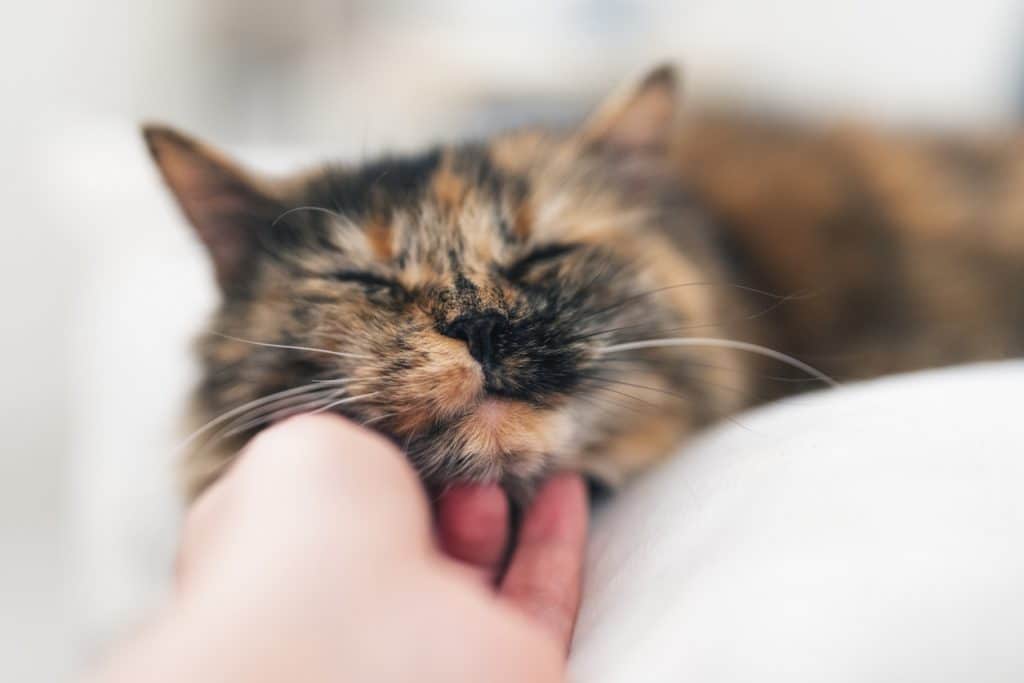
iStock/piranka
7. To Self-Soothe
Have you ever witnessed your cat purring at the vet? If you were baffled by this odd behavior, we have one explanation. (and sadly, no—it doesn’t mean your cat likes the vet). Purring actually acts as a self-soothing mechanism that eases nerves and helps your kitty deal with anxiety. So if you notice your cat is purring during a stressful situation, she’s most likely trying to stay calm.
8. Communicating Hunger
Usually, a cat who wants something won’t be shy about letting you know: especially when it comes to food. So when hunger strikes, your cat may purr loudly—and chirp, meow, lick you, rub against your legs, whatever it takes—to get your attention.
9. They’re in Heat
Cats make all kinds of noises when they’re trying to attract a mate. There’s the familiar caterwaul and yowl, but cats also purr softly when they’re ready to find a partner. This usually coincides with over-the-top affectionate behavior as well.
10. To Get a Human Attention
One of the most fascinating theories behind cat purring is the possibility that they’ve learned how to use it to get our attention.
A study conducted by the University of Sussex suggests that cats may have picked up on our nurturing instincts, prompting them to produce a sound that’s very hard for us to ignore. Dr. Conrad offers a description of this kind of purr: “A purr that is asking for something, such as food from the cat’s owner, tends to be much higher-pitched than other purrs, and is combined with a meow-type sound.”
This clever purr-and-cry combination occurs at nearly the same frequency of a human infant—between 220 and 520 Hz. It’s in our nature to respond to this urgent-sounding pitch. But does it suggest that cats have actually learned to manipulate us?
Dr Conrad offers some clarification. “This [type of purring] doesn’t necessarily mean that your cat has learned to manipulate you—just that a certain behavior gives them a certain positive result, and they make the association between the two.”
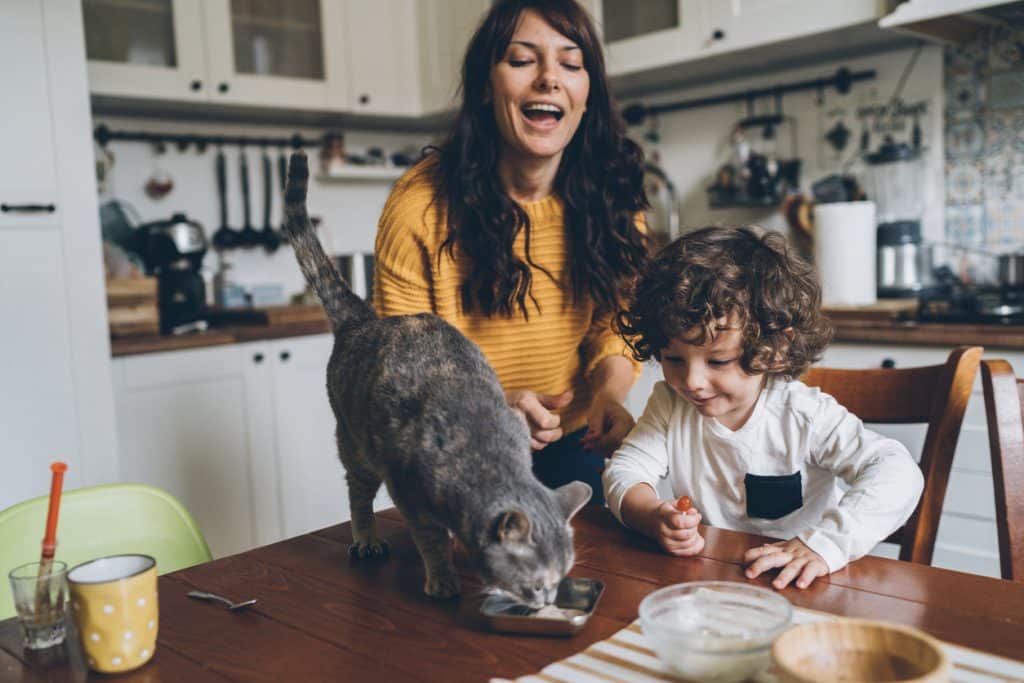
iStock/filadendron
How to Interpret Positive vs. Negative Purring
Curious about what your own cat is saying? Dr. Kong assures us it’s as easy as looking at the circumstances around a purr.
“They could be communicating happiness if they do it while receiving belly rubs,” she explains. “However, they could also be communicating that they’re in pain if they purr while displaying changes in facial expressions.”
Dr. Conrad weighs in with additional clues to watch for: “Is your cat curled up on their bed or your lap? Are they grooming or being groomed by a housemate? Relaxing in the sun? Any of these should indicate your cat’s purr is contentment,” she tells us.
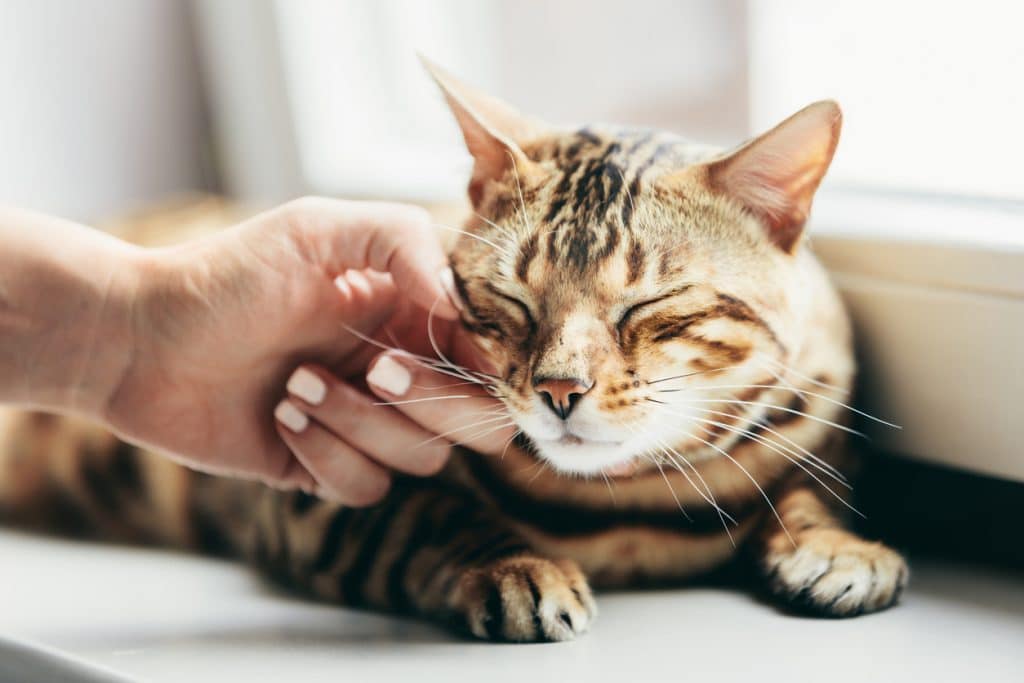
iStock/NiseriN
A high-pitched purr that starts close to mealtime is probably your cat’s way of requesting food. And purring accompanied with a twitching tail, wide pupils, or panting might mean your cat is in distress.
By and large, purring is a positive behavior. But if worrisome symptoms or behaviors occur alongside purring, you might need to take action, warns Dr. Conrad.
“Watch to see if your cat is eating, drinking, grooming, and generally acting normal,” she advises. “If you’re seeing any abnormal behavior along with the purring, it’s a good idea to seek veterinary advice.”
Takeaway: How Do Cats Purr?
While theories abound, science has yet to explain with 100% certainty what triggers cat purring. Our biggest clue lies with the brain, where cats have a unique neural oscillator that’s thought to cause purring. Purring happens when cats inhale and when they exhale.
As a cat breathes in and out, the muscles of their larynx dilate and constrict the area around their vocal chords (glottis). This causes air to vibrate over the laryngeal muscles, manifesting in the unique vibrato we know as the purr. Most domestic cats purr.
Certain big cats, from mountain lions, bobcats, and pumas, also purr. Others, like lions, tigers, jaguars, and most leopards, have a larynx better suited to roaring. These big cats have a large pad of tissue near the front portion of their vocal folds.
No matter the cause, it’s worth taking a moment to appreciate just how incredible such a simple sound can be. With healing properties and an evolutionary origin, a cat’s purr is, perhaps more impressive than we ever realized.
